#because any attempts i make will be completely disregarded because my opinions about the church are invalid because i left.
Explore tagged Tumblr posts
Text
man it just really sucks having to go through all the motions and acting like i'm happy and proud of my family members when i'm really, really fucking not. sick of this shit
#my brother has just reached a Big Milestone in the culture which of course just means he's in it deeper.#and he's gonna be pulling other people into it too.#and i gotta put on a face and pretend im proud of him because if i dont it'll just be another Family Heretic Moment from winter#of which there are many already and they don't take any of my opinions or criticisms seriously anymore because im an Outsider now.#in my own goddamn family.#but idk idk just. it sucks having to watch my siblings get deeper into this shit and not be able to do anything to help them#because any attempts i make will be completely disregarded because my opinions about the church are invalid because i left.#HATE this shit man. i cannot fucking wait to get out of here.#i also keep having nightmares that my brother is gonna die while on his mission so that is NOT helping how im feeling about it.#lmfao just fuckin imagine. the ONE member of my family who becomes an atheist ends up having prophetic powers#whatever#winter speaks#personal
6 notes
·
View notes
Text
The revelations to St. Faustina weren’t ‘private revelation’--Pope Benedict XVI
When he was the head of the Congregation for the Doctrine of the Faith, Pope Benedict XVI was asked by St. John Paul II to provide a theological reflection on the Third Secret of Fatima. (There’s a problem with the way the Vatican website is displaying quotation marks, so I am posting it here.) Then-Cardinal Ratzinger’s key move was to describe what visionaries receive, not as private revelation, but as contemporary “prophecy.” The same point is to be applied to all such visions and apparitions, including those prayer experiences that St. Faustina writes about in her Diaries.
THEOLOGICAL COMMENTARY
A careful reading of the text of the so-called third “secret” of Fatima, published here in its entirety long after the fact and by decision of the Holy Father, will probably prove disappointing or surprising after all the speculation it has stirred. No great mystery is revealed; nor is the future unveiled. We see the Church of the martyrs of the century which has just passed represented in a scene described in a language which is symbolic and not easy to decipher. Is this what the Mother of the Lord wished to communicate to Christianity and to humanity at a time of great difficulty and distress? Is it of any help to us at the beginning of the new millennium? Or are these only projections of the inner world of children, brought up in a climate of profound piety but shaken at the same time by the tempests which threatened their own time? How should we understand the vision? What are we to make of it?
Public Revelation and private revelations--their theological status
Before attempting an interpretation, the main lines of which can be found in the statement read by Cardinal Sodano on 13 May of this year at the end of the Mass celebrated by the Holy Father in Fatima, there is a need for some basic clarification of the way in which, according to Church teaching, phenomena such as Fatima are to be understood within the life of faith. The teaching of the Church distinguishes between “public Revelation” and “private revelations”. The two realities differ not only in degree but also in essence. The term “public Revelation” refers to the revealing action of God directed to humanity as a whole and which finds its literary expression in the two parts of the Bible: the Old and New Testaments. It is called “Revelation” because in it God gradually made himself known to men, to the point of becoming man himself, in order to draw to himself the whole world and unite it with himself through his Incarnate Son, Jesus Christ. It is not a matter therefore of intellectual communication, but of a life-giving process in which God comes to meet man. At the same time this process naturally produces data pertaining to the mind and to the understanding of the mystery of God. It is a process which involves man in his entirety and therefore reason as well, but not reason alone. Because God is one, history, which he shares with humanity, is also one. It is valid for all time, and it has reached its fulfilment in the life, death and resurrection of Jesus Christ. In Christ, God has said everything, that is, he has revealed himself completely, and therefore Revelation came to an end with the fulfilment of the mystery of Christ as enunciated in the New Testament. To explain the finality and completeness of Revelation, the Catechism of the Catholic Church quotes a text of Saint John of the Cross: “In giving us his Son, his only Word (for he possesses no other), he spoke everything to us at once in this sole Word--and he has no more to say... because what he spoke before to the prophets in parts, he has now spoken all at once by giving us the All Who is His Son. Any person questioning God or desiring some vision or revelation would be guilty not only of foolish behaviour but also of offending him, by not fixing his eyes entirely upon Christ and by living with the desire for some other novelty” (No. 65; Saint John of the Cross,The Ascent of Mount Carmel, II, 22).
Because the single Revelation of God addressed to all peoples comes to completion with Christ and the witness borne to him in the books of the New Testament, the Church is tied to this unique event of sacred history and to the word of the Bible, which guarantees and interprets it. But this does not mean that the Church can now look only to the past and that she is condemned to sterile repetition. The Catechism of the Catholic Church says in this regard: “...even if Revelation is already complete, it has not been made fully explicit; it remains for Christian faith gradually to grasp its full significance over the course of the centuries” (No. 66). The way in which the Church is bound to both the uniqueness of the event and progress in understanding it is very well illustrated in the farewell discourse of the Lord when, taking leave of his disciples, he says: “I have yet many things to say to you, but you cannot bear them now. When the Spirit of truth comes, he will guide you into all the truth; for he will not speak on his own authority... He will glorify me, for he will take what is mine and declare it to you” (Jn 16:12-14). On the one hand, the Spirit acts as a guide who discloses a knowledge previously unreachable because the premise was missing--this is the boundless breadth and depth of Christian faith. On the other hand, to be guided by the Spirit is also “to draw from” the riches of Jesus Christ himself, the inexhaustible depths of which appear in the way the Spirit leads. In this regard, the Catechism cites profound words of Pope Gregory the Great: “The sacred Scriptures grow with the one who reads them” (No. 94; Gregory the Great,Homilia in Ezechielem I, 7, 8). The Second Vatican Council notes three essential ways in which the Spirit guides in the Church, and therefore three ways in which “the word grows”: through the meditation and study of the faithful, through the deep understanding which comes from spiritual experience, and through the preaching of “those who, in the succession of the episcopate, have received the sure charism of truth” (Dei Verbum, 8).
In this context, it now becomes possible to understand rightly the concept of “private revelation”, which refers to all the visions and revelations which have taken place since the completion of the New Testament. This is the category to which we must assign the message of Fatima. In this respect, let us listen once again to the Catechism of the Catholic Church: “Throughout the ages, there have been so-called ‘private' revelations, some of which have been recognized by the authority of the Church... It is not their role to complete Christ's definitive Revelation, but to help live more fully by it in a certain period of history” (No. 67). This clarifies two things:
1. The authority of private revelations is essentially different from that of the definitive public Revelation. The latter demands faith; in it in fact God himself speaks to us through human words and the mediation of the living community of the Church. Faith in God and in his word is different from any other human faith, trust or opinion. The certainty that it is God who is speaking gives me the assurance that I am in touch with truth itself. It gives me a certitude which is beyond verification by any human way of knowing. It is the certitude upon which I build my life and to which I entrust myself in dying.
2. Private revelation is a help to this faith, and shows its credibility precisely by leading me back to the definitive public Revelation. In this regard, Cardinal Prospero Lambertini, the future Pope Benedict XIV, says in his classic treatise, which later became normative for beatifications and canonizations: “An assent of Catholic faith is not due to revelations approved in this way; it is not even possible. These revelations seek rather an assent of human faith in keeping with the requirements of prudence, which puts them before us as probable and credible to piety”. The Flemish theologian E. Dhanis, an eminent scholar in this field, states succinctly that ecclesiastical approval of a private revelation has three elements: the message contains nothing contrary to faith or morals; it is lawful to make it public; and the faithful are authorized to accept it with prudence (E. Dhanis,Sguardo su Fatima e bilancio di una discussione, in La Civiltà Cattolica 104 [1953], II, 392-406, in particular 397). Such a message can be a genuine help in understanding the Gospel and living it better at a particular moment in time; therefore it should not be disregarded. It is a help which is offered, but which one is not obliged to use.
The criterion for the truth and value of a private revelation is therefore its orientation to Christ himself. When it leads us away from him, when it becomes independent of him or even presents itself as another and better plan of salvation, more important than the Gospel, then it certainly does not come from the Holy Spirit, who guides us more deeply into the Gospel and not away from it. This does not mean that a private revelation will not offer new emphases or give rise to new devotional forms, or deepen and spread older forms. But in all of this there must be a nurturing of faith, hope and love, which are the unchanging path to salvation for everyone. We might add that private revelations often spring from popular piety and leave their stamp on it, giving it a new impulse and opening the way for new forms of it. Nor does this exclude that they will have an effect even on the liturgy, as we see for instance in the feasts of Corpus Christi and of the Sacred Heart of Jesus. From one point of view, the relationship between Revelation and private revelations appears in the relationship between the liturgy and popular piety: the liturgy is the criterion, it is the living form of the Church as a whole, fed directly by the Gospel. Popular piety is a sign that the faith is spreading its roots into the heart of a people in such a way that it reaches into daily life. Popular religiosity is the first and fundamental mode of “inculturation” of the faith. While it must always take its lead and direction from the liturgy, it in turn enriches the faith by involving the heart.
We have thus moved from the somewhat negative clarifications, initially needed, to a positive definition of private revelations. How can they be classified correctly in relation to Scripture? To which theological category do they belong? The oldest letter of Saint Paul which has been preserved, perhaps the oldest of the New Testament texts, the First Letter to the Thessalonians, seems to me to point the way. The Apostle says: “Do not quench the Spirit, do not despise prophesying, but test everything, holding fast to what is good” (5:19-21). In every age the Church has received the charism of prophecy, which must be scrutinized but not scorned. On this point, it should be kept in mind that prophecy in the biblical sense does not mean to predict the future but to explain the will of God for the present, and therefore show the right path to take for the future. A person who foretells what is going to happen responds to the curiosity of the mind, which wants to draw back the veil on the future. The prophet speaks to the blindness of will and of reason, and declares the will of God as an indication and demand for the present time. In this case, prediction of the future is of secondary importance. What is essential is the actualization of the definitive Revelation, which concerns me at the deepest level. The prophetic word is a warning or a consolation, or both together. In this sense there is a link between the charism of prophecy and the category of “the signs of the times”, which Vatican II brought to light anew: “You know how to interpret the appearance of earth and sky; why then do you not know how to interpret the present time?” (Lk 12:56). In this saying of Jesus, the “signs of the times” must be understood as the path he was taking, indeed it must be understood as Jesus himself. To interpret the signs of the times in the light of faith means to recognize the presence of Christ in every age. In the private revelations approved by the Church--and therefore also in Fatima--this is the point: they help us to understand the signs of the times and to respond to them rightly in faith.
The anthropological structure of private revelations
In these reflections we have sought so far to identify the theological status of private revelations. Before undertaking an interpretation of the message of Fatima, we must still attempt briefly to offer some clarification of their anthropological (psychological) character. In this field, theological anthropology distinguishes three forms of perception or “vision”: vision with the senses, and hence exterior bodily perception, interior perception, and spiritual vision (visio sensibilis - imaginativa - intellectualis). It is clear that in the visions of Lourdes, Fatima and other places it is not a question of normal exterior perception of the senses: the images and forms which are seen are not located spatially, as is the case for example with a tree or a house. This is perfectly obvious, for instance, as regards the vision of hell (described in the first part of the Fatima “secret”) or even the vision described in the third part of the “secret”. But the same can be very easily shown with regard to other visions, especially since not everybody present saw them, but only the “visionaries”. It is also clear that it is not a matter of a “vision” in the mind, without images, as occurs at the higher levels of mysticism. Therefore we are dealing with the middle category, interior perception. For the visionary, this perception certainly has the force of a presence, equivalent for that person to an external manifestation to the senses.
Interior vision does not mean fantasy, which would be no more than an expression of the subjective imagination. It means rather that the soul is touched by something real, even if beyond the senses. It is rendered capable of seeing that which is beyond the senses, that which cannot be seen--seeing by means of the “interior senses”. It involves true “objects”, which touch the soul, even if these “objects” do not belong to our habitual sensory world. This is why there is a need for an interior vigilance of the heart, which is usually precluded by the intense pressure of external reality and of the images and thoughts which fill the soul. The person is led beyond pure exteriority and is touched by deeper dimensions of reality, which become visible to him. Perhaps this explains why children tend to be the ones to receive these apparitions: their souls are as yet little disturbed, their interior powers of perception are still not impaired. “On the lips of children and of babes you have found praise”, replies Jesus with a phrase of Psalm 8 (v. 3) to the criticism of the High Priests and elders, who had judged the children's cries of “hosanna” inappropriate (cf. Mt 21:16).
“Interior vision” is not fantasy but, as we have said, a true and valid means of verification. But it also has its limitations. Even in exterior vision the subjective element is always present. We do not see the pure object, but it comes to us through the filter of our senses, which carry out a work of translation. This is still more evident in the case of interior vision, especially when it involves realities which in themselves transcend our horizon. The subject, the visionary, is still more powerfully involved. He sees insofar as he is able, in the modes of representation and consciousness available to him. In the case of interior vision, the process of translation is even more extensive than in exterior vision, for the subject shares in an essential way in the formation of the image of what appears. He can arrive at the image only within the bounds of his capacities and possibilities. Such visions therefore are never simple “photographs” of the other world, but are influenced by the potentialities and limitations of the perceiving subject.
This can be demonstrated in all the great visions of the saints; and naturally it is also true of the visions of the children at Fatima. The images described by them are by no means a simple expression of their fantasy, but the result of a real perception of a higher and interior origin. But neither should they be thought of as if for a moment the veil of the other world were drawn back, with heaven appearing in its pure essence, as one day we hope to see it in our definitive union with God. Rather the images are, in a manner of speaking, a synthesis of the impulse coming from on high and the capacity to receive this impulse in the visionaries, that is, the children. For this reason, the figurative language of the visions is symbolic. In this regard, Cardinal Sodano stated: “[they] do not describe photographically the details of future events, but synthesize and compress against a single background facts which extend through time in an unspecified succession and duration”. This compression of time and place in a single image is typical of such visions, which for the most part can be deciphered only in retrospect. Not every element of the vision has to have a specific historical sense. It is the vision as a whole that matters, and the details must be understood on the basis of the images taken in their entirety. The central element of the image is revealed where it coincides with what is the focal point of Christian “prophecy” itself: the centre is found where the vision becomes a summons and a guide to the will of God…
Joseph Card. Ratzinger Prefect of the Congregation for the Doctrine of the Faith
#Ratzinger#prophecy#mercy what every catholic needs to know#divine mercy#st. faustina#fatima#guadalupe
11 notes
·
View notes
Note
I mean to ask this genuinely, no hostility, but can you explain how you correlate scp to being in a cult? I dont disagree, I just cant articulate the reasoning as to why I dont disagree, and would like to see where youre coming from with this. Also, could you tag it with cults or cult discussion or something similar, please? Thanks! Have a good day.
OK [cracks knuckles] I will try and keep this as short as possible, but you have to understand I’ve been observing the wiki in the wild literally since its inception, so there is a lot of stuff to consider. anyway let’s buckle up.
[EDIT: after finishing, this is obnoxiously long. sorry. I encourage people to read it though, because yikes.]
I base this theory on a set of guidelines set out for spotting if an organisation might be a cult. generally cults are religiously based; obviously this does not apply here. as far as I’m aware, nobody sees the SCP wiki as a religion (yet). because of this a couple of the points regarding spotting a cult are irrelevant (they concern things like separation from the Church which obviously doesn’t apply) but nearly all of the others (even some religious ones) can apply if we provide context. so without further ado:
Signs You’re In A Cult and How the SCP Wiki Literally Fits Into All of Them
let’s start with the most obvious:
opposing critical thinking
something that has long pissed me off about the SCP wiki has been its complete inability to think critically. staff will literally ban people for criticising them, and the parameters of “criticism” have only grown wider and wider over the years. anything that is the “party line” is sacred; nothing can be improved upon because it’s already perfect, and Staff Knows Best. any policy changes are law, and any dissenting voices are silenced – even among younger staff members (length of service wise, not age wise). I have seen staff put on probation or demoted for arguing against pointless or pedantic policy changes; I have seen people of all levels banned for arguing with staff. if this doesn’t happen right away, arguing with staff over their decisions will absolutely get a target on your back, and they will find a way to ban or demote you as soon as they can.
any criticism on the wiki is frowned upon unless it comes from the Major Staff Members – these are people at the top of the hierarchy who can do no wrong, and as you can imagine, they’ve done some shit. staff has always had a problem with elitism, bullying, and even abusive behaviour (blah blah blah #NotAllStaff, but the ratio is quite concerning) and any criticism of their behaviour or even pointing this fact out is dangerous if you want to remain on the wiki. hell, I know many people who are aware of this who don’t speak up because they’re genuinely scared of retaliation. a lot of staff are really nasty people, and because of this attitude they are beyond criticism.
isolating members and penalising them for leaving
the penalising them for leaving part isn’t strictly accurate, because as far as I know, nobody has ever been bullied or threatened into staying on the wiki. however, I do remember a while back (2011/2012-ish) when the Foundation RP community began to show up on Tumblr, and the wiki began to get a fanbase that wasn’t contained on the site itself. staff were not happy about this and to this day they still constantly try and get a monopoly on all off-site locations. they have an official Offsite Outreach Team (yes, that’s its real name) who “reach out” to communities on other platforms (YouTube, Reddit, Tumblr, etc) and set up an Official Presence there, and then they encourage everyone to use the Official Presence rather than the fan-made ones (which are often more established and better/more consistently run). there have been several off-site spats between staff and the fandom, because they arrive demanding the authority and respect they have on the wiki and get Big Mad when they don’t get it. just recently one (now ex) staff member, djkaktus, went absolutely primal on Reddit and banned a whole bunch of the community for daring to say that they didn’t like the new LGBT logo for pride month (many of these people were LGBT themselves and felt as though it was pandering/putting targets on their backs); several more years ago (2014, I believe?) I myself had a run in with the Outreach Team and it was one fucking hell of a headache that ended in a malicious smear campaign against me, so like. yeah.
as for isolating members, they do this via elitism. the above is an example of it (making everyone feel a sense of obligation or loyalty to the Official Presence), but a huge part of it has always been the elitist attitude prevalent on the wiki. the SCP wiki has high standards for writing (allegedly… I’ve seen some garbage on there tbh, same as any other website) and it uses this to bully and demean its users. criticism of writing is overly harsh but highly encouraged; anyone complaining that it was too cruel (which it often is) is ridiculed for being too sensitive. (staff have been working on this for years, but really nothing has changed; people have just gotten more between-the-lines about it.) this encourages a kind of desperation among new users to “rise up the ranks” and earn respect so they can be the ones dishing out the criticism instead; they will do so and then immediately act in accordance to their status, bullying others how they were bullied and sticking to their own “rank”. brief interruption: staff and bootlickers if you’re reading this and thinking of reblogging to defend yourself, the code word is yeet. if I do not see the word yeet in your reply I will know you have not read this thoroughly and tell me why I should then bother reading anything you have to say.staff themselves is incredibly removed and closed off from the rest of the community; they have a bunch of private chat rooms they hang out in, and inter-dating is common. they don’t tend to interact much outside the flock, and are the definition of cliquey. joining this rank is supposed to be an achievement, but really it’s probably the most dangerous place to be. I have seen so many staff members have literal, clinical mental breakdowns over the strain and treatment they suffer.
(there’s nowhere to neatly slot this in, so: I don’t know how many people have noticed this, but SCP fans, when you spot them on other platforms, are snooty. not casual fans, but those involved with the wiki? I can spot them from a mile away, because whenever the Foundation is mentioned, there they are, acting like they’re part of some cool club. some of these people are innocent (they’re just mimicking the behaviour of other members) but some of them really do seem to think that their site is somehow better than whatever site they’re on, and it’s really creepy to see.)
emphasising special doctrines outside of scripture
obviously this is religion-specific, but with context it can fit. if we take scripture to mean SCP lore, and special doctrines to mean differing headcanons, ideas, writing styles, etc… oh boy.
there’s something that’s often said on the wiki: there is no canon. buddy, there is. yes, you can write whatever you want technically, and you can disregard headcanons you don’t like and you can build on different things and theoretically people can just ignore your shit if they don’t like it, but that is not what happens. there is absolutely a canon, and deviating from it will get you downvoted into oblivion and even personally attacked. people will accuse you of the most ridiculous shit, like desecrating the wiki or betraying the universe or whatever. so where does the emphasising part of this come in?
why, it’s simple! if one of these special doctrines (headcanons or whatever) comes from staff or an Approved Member, it’s fine. go nuts. even if it’s something that anybody else would be absolutely slaughtered for, it’s fine if staff approves. there is no creative freedom on that wiki, and anyone attempting to carve a piece out for themselves will suffer for it. one of my close friends still gets hate for an SCP he wrote featuring heavy headcanons and building on existing lore about a well-known character, and some of this hate is because he didn’t set the fucking article out “how it should be”.
seeking inappropriate loyalty to their leaders
oh boy. staff are god on that website. they’ll deny it, but they know it’s true. many of them are arrogant and, in my opinion, some of them are pathologically narcissistic. they think they are hot shit, and they encourage people on the site to believe the same. a huge majority of users on the wiki are high school students, so 15-18 years old. the next huge group are college-aged, so 19-22 or so. several staff members are in their mid-20s up to 30s, maybe even coming 40s or early 40s now. when you’re in your mid-20s, it’s very easy to look cool to a 15-year-old. it’s very easy to look at a young userbase and convince them that you’re hot shit, and that’s what staff do. they act like it; most users respond to it, and if anyone dissents? see point one.
staff have always had double standards. from the very beginning of staff, they have gotten away with a lot more than the average user. staff have been allowed to bully, ridicule, harass, dismiss, shit upon, and target people with reckless abandon, usually only meeting punishment when other staff members feel too inconvenienced by them. a lot of the time when they’re punished, it’s a lot lighter than it would have been for an average user (a month ban rather than a permaban, for example). this is seen as almost a point of hilarity for a lot of people, who think it’s cool and just a right you get when you’re staff. you know best, you’ve seen some shit – who can blame you for slamdunking a 15-year-old’s first SCP?
the amount of respect and adoration these people demand is ridiculous, and anybody daring to criticise them ends up on a shitlist. staff show up in other areas (Tumblr or Reddit) and expect that same amount of respect, even among people outside of the wiki who might just be casual fans. they act a lot more important than they are, and demand that everyone treats them appropriately. I’ve seen staff members throw shitfits because they didn’t get enough upvotes for their articles, and many staff members’ quality of work declines when they make staff, simply because they know that they’ll get easy upvotes as soon as people realise it’s a staff member who wrote it. downvotes are enough to get you put on a shitlist.
publicly, their word is law. you are not allowed to debate with them in the forums if they put a “stop” on the topic; the same applies in the IRC chat. if staff says “stop”, you will be punished if you mention it again. you are allowed to discuss it with them privately, but I think that’s rather insidious, as staff have been known to twist facts and withhold information before. this gives them a public persona of always being right – and something else that cults do is silence dissenting voices so nobody who might agree can see other people saying the same things and feel encouraged/emboldened.
crossing Biblical boundaries of behaviour
again, we’ll need to contextualise this. if Biblical boundaries are things like sins and all the stuff the Bible says Do Not Do, then in this context these are the wiki rules. staff (and their friends) will constantly cross the rules, as previously mentioned, and they will get away with it.
the wiki rules say “don’t be a dick”. I have caught staff bullying people countless times, and no doubt there’s more I haven’t caught. even out in the open, staff are argumentative, dismissive, rude, intimidating, and oftentimes plain nasty. the wiki rules say “don’t coldpost articles; get feedback”. staff is just out there throwing their shit onto the wiki and expecting an avalanche of upvotes in five minutes Or Else. policies are made that set parameters and staff changes them whenever convenient – for example, the long-standing rule that things that occur off-site are not the responsibility of the Disciplinary Committee (yes, its name.). unless, of course, it’s someone they don’t like. a major staff member bullies somebody on Tumblr? “sorry, it was offsite, not our problem”. someone staff doesn’t like gets into a brief spat on Reddit? banned for harassment.
there are countless examples of this, from small things to major things like bullying, harassment, and even abuse (or enabling of abuse). staff will punish people for transgressions and then turn a blind eye to a fellow staff member committing a transgression that was ten times worse. they have even protected rapists and sexual predators in the past – another kind of behaviour common in cults, because that’s what happens when you combine narcissism and entitlement with total authority.
that’s the main bulk of it
but now the context has been established, here are a few more concerning things I’ve noticed (quickfire now):
cults shit on former members
and the wiki does the same. any staff member that’s grown fed up of the groupthink and the cliquey attitude and how nasty people are or who has been mistreated by staff themselves; any regular user who feels the same and vocally quits? shat upon. lauded as a bastion of whatever is wrong with the wiki. declared an Enemy and rallied against. it is so creepy.
cults use Us vs Them mentality, especially in language
broad declarations establishing a community and a community spirit in the face of adversity are common in cults. appeals to emotion and loyalty are used in a very manipulative way. catastrophising and fearmongering is common, too. I’m seeing this in how the recent drama with the legal issues is being handled. broad appeals to “defend the wiki”, hashtags being encouraged, emotional speeches from staff about how it’s a make or break situation…

…and this is being reflected in the absolutely insane comments people are responding with.
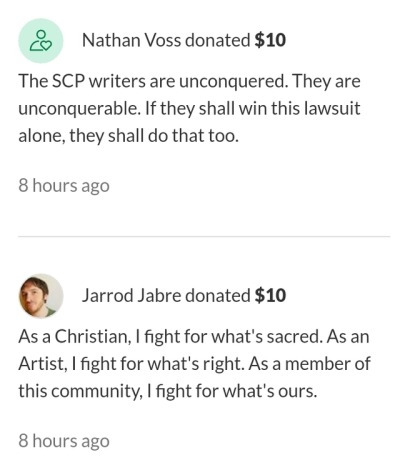
this is a fucking writing website. the above is not a normal reaction at all.
the attitudes of regular users quickly grow concerning
people very quickly get obsessed with the wiki and it defines their lives. they seem to feel as though they owe something to it or they need to serve some kind of a purpose; many people try and “get the word out” and become voluntary spokespeople. they go around practically preaching, and I do not see the users of any other website doing this.
cults want full control over how they’re seen by outsiders
and the scp wiki does the same. as mentioned previously, when the fandom grew and spiralled off the wiki to other sites, staff debated for weeks over what to do. brief interruption the second code is shrek is life.they were not comfortable with the idea of the wiki having an independent fandom, and for years now they have been in constant struggle with offsite communities, trying to gain the same amount of control they have over the wiki. it’s impossible to do so thoroughly, and it’s clearly an annoyance for them.
cult leaders will let “lesser” members do their dirty work for them
and guess what staff does? rather than wade in there and get their hands dirty with internet arguments, they’ll sit back and let regular users dogpile on dissenters and say all the things staff shouldn’t be seen to say in public. note how even if this would violate the bullying policies, they’ll just get a warning so long as staff agrees.
in conclusion
@ everyone on the scp wiki: yall know you’re in a cult, right?
174 notes
·
View notes
Text
THE 2020 ELECTION
Again, everyone and their gerbil is chiming in about the upcoming election, so I figure I should join in, too. Before continuing, you should know I haven't been studying anyone else's reasoning for which candidate they'll support. What I'm writing now is something I've been planning on doing for several weeks. So enough with the preliminaries, let me come right out with it.
I'll be voting for Trump and Pence this election. As I've said before, there are some of Trump's tweets that makes me wince, and certain public spats he gets involved in which I sometimes find completely unnecessary. But it's my opinion that the Trump/Pence ticket is the best choice for America at this point in time.
I suppose I could focus on the positive things Trump has done and act as a cheerleader for his campaign. But there are people who get paid to do that. And besides, you can look all that up for yourself (although you may have to do some digging, considering how the mainstream media hardly talk about it). But right now I'm going to mostly focus on something else, on why I can't vote for the Democrats.
First of all, it took far too long for the Biden campaign to denounce the violent protests that occurred throughout America over the past summer. In fact, some of Biden's staffers even chipped in to provide bail for the destructive anarchists who were causing the damage. So that makes me seriously wonder about their commitment to peace and whether their campaign will engage in machiavellian tendencies to anarchy, which you know I can't support.
If you're concerned about censorship in social media or in other aspects of life, then you may want to reconsider supporting a Democrat in the 2020 election. If you recall, the tech companies who have been engaging in censorship of conservative content or content that could potentially harm Democrat candidates are the same ones who were nearly brought to tears when Hillary Clinton lost the election in 2016. They've made no secret of their support for left-leaning causes and candidates, and if Biden & Harris are elected, I suspect dissidents and people with what they consider the "wrong ideas" will likely experience censorship on a more widespread level. I heard a report that the Biden campaign actually requested that Facebook begin to censor the Trump campaign. And remember, the left is the party that in some quarters declared that "speech is violence" and actively engaged in silencing speakers (sometimes violently) on American campuses. Freedom of speech is a bedrock of America. If you value it, then you should really stop and consider which candidates will fight for it and which ones will casually erode our treasured freedoms without even batting an eye.
I cannot support the left's abhorrent disregard for human life and I can never forget Governor Northam's talk about keeping a newborn baby "comfortable" while the parents gibly decide whether to keep it alive or not. Infanticide is still infanticide no matter how you may describe it. Many Democrats support unlimited abortion (or infanticide) for any reason, and I can't embrace that. And as for the thousands of elderly coronavirus deaths from nursing homes in Democrat-run states, that's an issue for another day that deserves its very own post.
The left has repeatedly made clear their disdain for people of faith. Just look at how Democrats treated Kavanaugh during his confirmation hearing in 2019 and how they treated Amy Coney Barrett during her previous confirmation. Take some time and do research on how many companies & organizations besides Amazon follow the Southern Poverty Law Center's guidelines for charity giving, etc. According to them and others, many faith-based organizations are considered some kind of threat to society for simply believing (as I do) that marriage is defined as a relationship between a man and a woman. And does anyone remember how some Democrat localities and states treated churches & people who tried to attend services during the pandemic? It's just a hunch, but I have a feeling that would likely continue and possibly increase under a potential Democrat administration.
I know there are some Republicans who pay lip service to faith, if only just to gain votes. And I'm not terribly concerned about either the right or the left trying to stamp out people of faith. God is sovereign and He's in control of it all, not them. Christianity & Judaism have persevered for centuries despite severe persecution at times. God's kingdom is the rock from the vision of the book of Daniel, the heavenly kingdom that will supersede and outlast all earthly kingdoms. I speak out for freedom of religion because I don't want to see America become another communist China or socialist Venezuela where both Muslims & Christians alike are targeted for what they believe.
This not-so-recent behavior of the left to attempt to change the rules if you don't like how something turns out is another reason why I can't vote Democrat this election. Look, I'm not naïve enough to believe that Democrats are the only ones who are willing to do this. Republicans have likely also been guilty of this in terms of redistricting of voter precincts, etc. But I'm just a bit astounded (and not astounded) by the fact that Nancy Pelosi & others have proposed creating an oversight committee to decide any President's fitness for leadership, and by the various calls from the left to literally pack the Supreme Court by adding more than nine judges (and likely potentially left-leaning judges). Presidents are decided by the public & the electoral college, not by a Congressional committee & unelected board members, and the Supreme Court isn't meant to be some kind of factory for churning out legislation. They're there to evaluate laws, not make them.
And I know I'm being long-winded here, but if you would just bear with me for just a little more. The progressive left have made it public that electing Joe Biden is "a doorway to a destination". In other words, Biden isn't liberal enough for them, and if he is elected, they'll push to enact their own aggresively liberal agenda in all of its toxic forms. In my opinion, there are too many far-left liberals in all aspects of government already who have done lasting damage to America. Do you really think Lt. Col. Vindman is the only liberal in the military who strives to advance their own agenda at the expense of the country? What could have been if Lt. Col. Vindman & the Democrats in Congress had chosen to focus on preparing for this pandemic instead of spending time on an unnecessary impeachment in November & December of 2019? And do you really think Sheriff Scott Israel is the only liberal in law enforcement who would rather talk about gun control instead of focusing on the real causes & other potential solutions to society's problems? I know there are good people who work in government, but I've seen others who have become nearly psychotic in their pursuit of baseless investigations and mindless causes, so much so that I'm truly concerned about our national & local security with some of these types of people in charge. And heaven help us if green new deal subjects like cow flatulence become a top priority for America in 2021 and beyond.
Unfortunately, many of these people, or liberal activists to be more accurate, can't be voted out. But that's why I'm voting for Trump & Pence this election. I believe they're the best chance we have for addressing the problems & excesses of unelected bureacrats in government. I know that Republicans sometimes give a free-pass to certain organizations. And I realize that conservatism doesn't always equal Christianity. Sometimes they do a disservice to America's other immigrants by lumping the bad ones with the good ones. The Bible says to lookout for the alien or immigrant (...but I agree with Republicans that doesn't mean open borders or being lax on immigrants who have committed heinous crimes.) And sometimes conservatives become far too chummy with corporations at the expense of the common people, when they should be fighting injustice wherever it's found. But this is how I'll be voting in this election. Of course there are some local Republicans I still can't support, and if the Republican party ever veers off into a completely crazy zone, I'll drop my support. I'm not bound to one party or the other.
And I hope you'll take what I've written today and evaluate it for yourself. Don't let me or anyone else do your thinking for you. Do your own homework, look at the issues, and cast your vote. Future generations will thank you for it.
1 note
·
View note
Text
Analyzing Emison
If you follow my blog, you probably noticed that Emison’s been on my mind today, judging by my posts. I’ve made a lot of brief, mostly snarky posts about why I don’t like their relationship, but I thought it was time I actually sit down and put together one big, comprehensive post detailing their whole relationship, from season one to season seven, and how I view it. I’ll put it under a cut because of length, and so any Emison shippers (or anyone else) can feel free to just skip over it if this isn’t your cup of tea.
Season 1
I was sour on any idea of an Emily/Alison romance from the very start. The first glimpse we get into their relationship, in fact, is mean and taunting in nature. This exchange doesn’t exactly set the stage for a couple I want to root for.

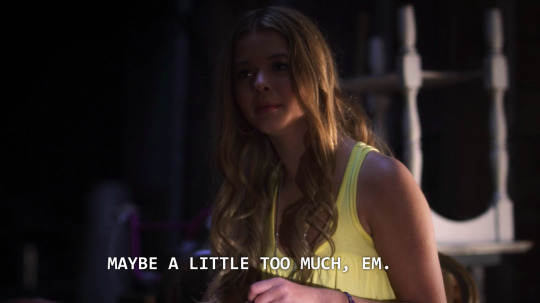
Since Alison isn’t actually a current character yet, this season basically just establishes Emily’s feelings for her and where their relationship stood before Alison disappeared. We learn that Emily was in love with Alison, her first crush, and was confident enough in her sexuality to give Ali a kiss. What followed was Alison verbally berating Emily, completely rejecting her advances, and treating her with cruelty for expressing her feelings.

The infamous “locker room scene” is what turned me off of them from the very beginning. There is no way, in my mind, that this can be chalked up to “internalized homophobia,” as I see so many fans attempt to argue. Alison knew that Emily was attracted to her. She knew this, and yet she still participated in seductive behavior by undressing in front of her, showing off her bra, and asking Emily to hook it for her. There is no way she didn’t realize exactly how her behavior was coming across, especially since she hadn’t initially rejected Emily’s kiss not long before. She was goading Emily into making a move, just so she could shoot her down and crush her self-esteem as soon as it happened. I firmly believe that if it hadn’t been for Ali’s mocking, judgmental attitude toward her sexuality, Emily wouldn’t have struggled nearly as much with coming out (and even beyond just this scene, I will never accept internalized homophobia as an excuse for tearing another person down).

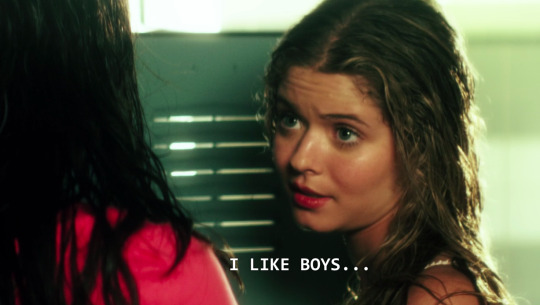
This season also establishes the idea that Emily was “special” to Alison. We get a few glimpses of Alison treating Emily differently, telling her things like “you’re the only one I can really trust.” Although I understand why these sweet little moments could come across as genuine, I see them as nothing more than Ali giving a little so she could take a lot - she buttered Emily up to make sure Emily’s feelings for her wouldn’t dissipate, then hurt her even more with her constant little jokes and comments. It’s a classic cycle of abuse.

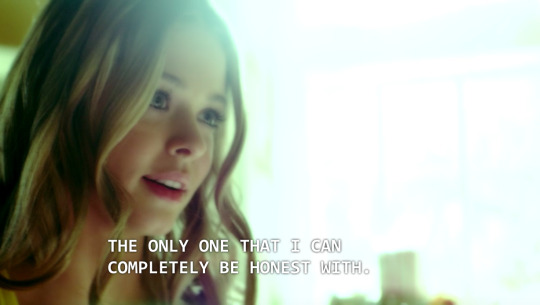
Seasons 2 - 3
Just like in the first season, these seasons continue to focus on Emily and Alison’s relationship purely through flashbacks. One of the biggest Emison moments comes when Ali pulls Emily from the barn in season two. She saves Emily, seduces her once again with “you’re my favorite” comments, and kisses her. Even as someone who’s about as anti-Emison as you can get, I admit that this is the first time I ever viewed Alison’s feelings as potentially genuine - but more on that later.

All in all, there’s not much to say about these seasons since there isn’t much to go off of. Emily’s biggest character development comes from finally embracing her sexuality and managing to let Alison go - the symbolism behind her removing the bracelet Alison gave her at last is a wonderful metaphor. All signs point to Emison being nothing more than a step in Emily’s journey, not an actual relationship to root for.
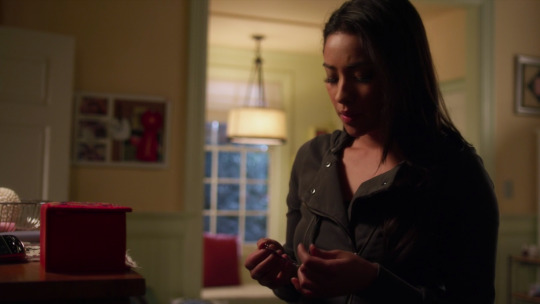
Season 4
It’s no coincidence that the season I start to dislike Emily’s character is the same season that Alison returns. As soon as the girls find out that she’s alive, she starts right back in on attempting to isolate Emily from the others: From her sneaking into Emily’s room and guilt-tripping her (although I have my doubts as to whether that scene actually happened), to promising to meet her at the Kissing Rock and never showing up, to insisting that Emily is the only one she can trust and demanding that she keep their clandestine meeting a secret from the other Liars. According to her story in the finale, she stopped suspecting the girls the night she went missing, so why exactly is she unwilling to let anyone but Emily in? It’s just as Spencer says: She’s playing games with them, attempting to reel Emily right back in through manipulation and isolation.


It was disgusting to see Emily start choosing Alison over her friends, putting the girl who did nothing but make her feel small and insecure above the girls who stood by her side no matter what. I’ll never understand why the writers were so willing to do such detriment to Emily’s character just for the sake of this ship. She’d come so far regarding her feelings for Alison and had really grown into herself, as a character and as a person. It was a shame to see her revert back to the little love-struck teen as soon as Alison reentered her life.
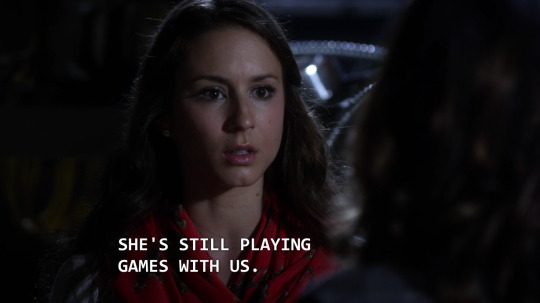
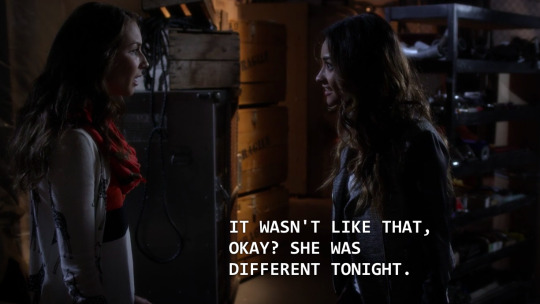
Season 5
This is where my dislike of Emison really cemented. Alison returned to Rosewood, and it was like nothing ever changed. She started bossing her friends around again, commandeering their lives with her lies, and sucking them back into the drama that she created.
I couldn’t possibly analyze my viewpoint on Emison without discussing “Miss Me x100,” one of the ship’s most instrumental episodes. For a lot of people, this episode confirmed that Alison truly did have sincere feelings for Emily. For me, it basically did the opposite. But wait, you might say, Alison came right out and confessed that the kisses she and Emily shared had been real. But let’s actually look at the context of that scene:
Alison is back from the dead. Hanna has made it explicitly clear that she wants nothing to do with her, Spencer is fed up with her games, and Aria is stuck in her own world, as usual. Emily is all Alison has left, and Ali knows that she’s the easiest to influence. But then Emily drops the bomb: She’s going to hang out with Paige, and Alison isn’t invited. In that moment, Emily chose Paige over Alison. It’s not by chance that Ali suddenly decided to admit her feelings for Emily right at that moment. Regardless of whether or not Alison actually did feel an attraction to Emily, there is no way her confession wasn’t intentionally manipulative, a clear attempt to sway Emily back over to her side. And it worked.
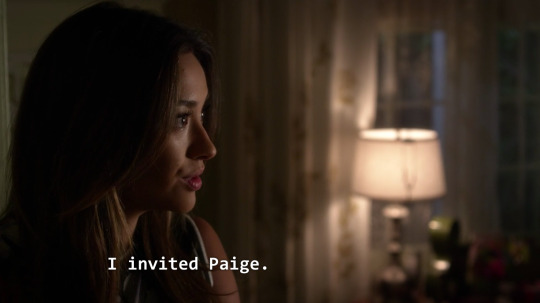

Also in this episode, we see Emison sleep together for the first time. Again, it’s easy to consider this evidence that Alison had to have had sincere feelings for her, but every time I watch that scene, I can’t help but think of how the rest of the episode plays out. The girls discover that Ali lied to them about her confrontation with Mona in the church, and Emily in particular is furious. That night, Alison goes to Emily’s house to ask for forgiveness...and she does so by stroking Emily’s hair and leaning in for a kiss. This, to me, is undeniable proof that Ali took full advantage of Emily’s feelings for her to manipulate and control her. And using sex or romance as a method of coercion is a classic sign of toxicity.

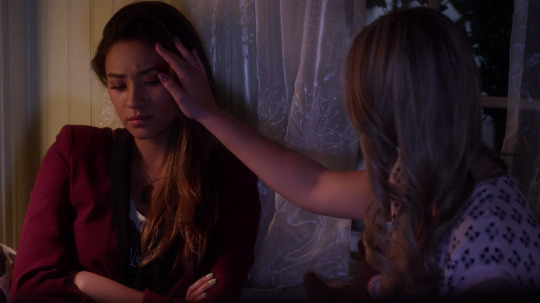
One of my favorite storylines in the whole show is Emily finally turning against Ali and breaking away from her at the end of 5A. I couldn’t stand her blind loyalty to someone who was so obviously manipulating and lying to her, and Emily giving Alison a piece of her mind at last was extremely satisfying. To me, that confrontation outside of Ali’s house was meant to be the end of any romantic prospect between them.

Season 6
There really isn’t a whole lot to say about this season because it contained next to no hints of romance between Emily and Alison. They barely even interacted as friends, let alone potential love interests. The only thing I can really say is that this season really showcased Alison’s inherent selfishness, and why Emily deserved much better. Yes, it was nice of Ali to stay with Emily during her procedure, but from wallowing in self-pity instead of supporting her traumatized friends, to callously disregarding their fear of Charlotte and manipulating them into advocating for her release, to to throwing them under the bus for Charlotte’s murder the second she wasn’t happy with them...I thought we were supposed to believe that Alison had gone through some sort of reformation, but all of season six seemed to prove otherwise.
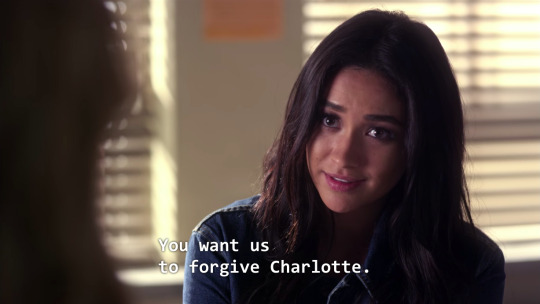

Season 7
And finally...here we are. Once again, the first half of the season passes with absolutely no romantic interactions between Emily and Alison (Emily accuses Ali of murder, for god’s sake). Until - surprise - Paige reenters the picture. Suddenly Ali is jealous, petty, and partaking in the same bitchy behavior that she was supposedly so remorseful for when she first returned to town. Apparently this was supposed to convince us that she truly did love Emily, but her sudden jealousy was so over-the-top and juvenile that it just made her come across as unhealthily possessive. It also made no sense, considering just a few weeks before she’d been in love with someone else and throwing Emily under the bus for Charlotte’s murder.


I know this is a very unpopular opinion, but Ali’s pregnancy reveal left a bad taste in my mouth, too. How convenient that she drops that bomb on Emily right after she notices Paige getting close to her again. And how funny that she was quick to criticize Emily for hanging out with Paige while dating Sabrina, but she had no qualms about kissing her that very same night.
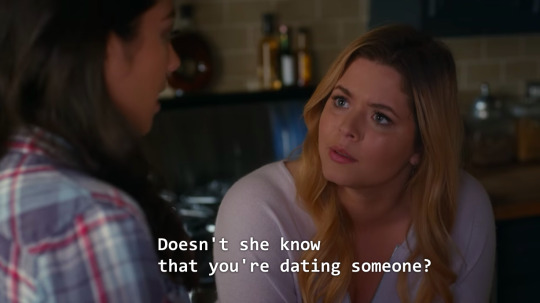
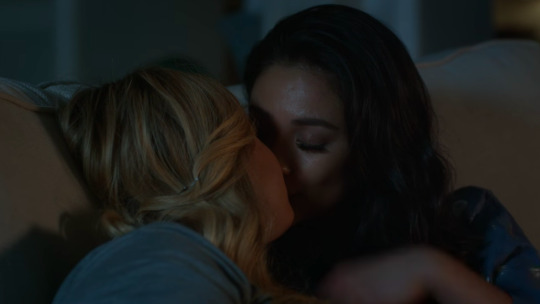
For the second time, we see Alison suddenly declaring an attraction to Emily when she has no one else, when she’s hit rock bottom and feels abandoned and alone. Why does she never seem to have these feelings otherwise? Call me crazy, but this doesn’t scream “authentic relationship” to me. It feels more like Alison considered Emily her last resort.
I’m not even going to really go into the implanted eggs storyline because I feel like I’ve already made it pretty clear how i feel about that, but over the course of season seven, we’re supposed to get a sense of Alison finally coming to terms with her sexuality and her true feelings for Emily. The main problem is that this comes only on the heels of finding out that she’s pregnant with Emily’s baby. From that point on, it really didn’t matter how they handled Emison getting together. There was no way they could frame it so it didn’t seem like it was only happening due to the pregnancy.

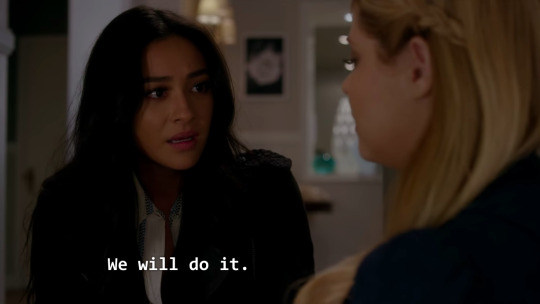
My other big problem, aside from the rape baby storyline in general, is that I never actually bought into Alison’s genuine feelings in this season. She was given numerous scenes in which she confessed her love for Emily, and yet...not one of them was convincing. Even her proposal in the finale was centered completely around how much Emily loved her. Not once did she actually discuss why she loved Emily. That fact, plus their completely wooden love scenes, did nothing to convince me that Alison had any feelings for Emily beyond loving the way Emily worshipped her.
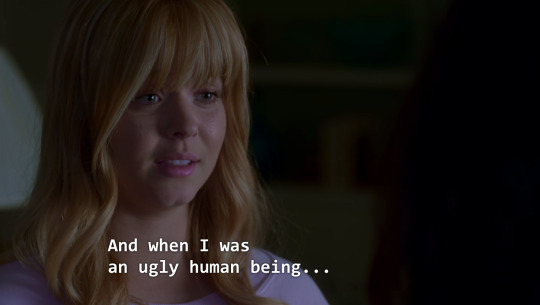

So there you have it, thanks to anyone who got through this essay that’s longer than anything I’ve written for school all semester. When it comes down to it, Emison was toxic and inconsistent up until the very end. Alison jerked Emily around for years, treated her as a comfort object and last resort, and never truly seemed to return her feelings. She manipulated her, lied to her, and never really gave her a genuine apology for her terrible actions. Emily, the way I see it, deserved better, and hopefully this post gives a little more insight into why I dislike Emison so strongly and just can’t buy into some beautiful love story between them, because I still continue to get regular asks about it.
41 notes
·
View notes
Text
☆ stars above, stars below ☆

pairing: leonard ‘bones’ mccoy x reader fandom: star trek reboot — out of movie sequence prompt: “i want to stare up at the stars with you one last time” notes: character death
—check out my other works; masterlist
─── ・ 。゚☆: *.☽ .* :☆゚. ───
All he could think about was the stars.
He never cared for them because they never captured his attention enough for him to gain any sort of appreciation for them. Why care for a huge ball of gas held together by gravity? The only star that mattered was the sun — not any other incomparable remote fragment. It’s needed for survival on Earth while other stars were there to look pretty.
He simply hated space and everything in it, including all the objects that didn’t harm him or benefit him — like stars.
Somehow, though, in this moment they appeared brighter than usual. Scattering charmingly across the night sky, their colors contrasting against the dark background. Regardless of what commotion occurred on any planet, they were always there, shining brightly.
It reminded him of you.
And maybe that’s why he was thinking so highly of them right now. He was vulnerable, unsure of what fate has in store for him. Their remoteness triggered fond memories of you always being there by his side. Never once leaving even when his unlovable flaws appeared. Nothing could keep you away from the Southern doctor.
He wished to be with you. To hold you and kiss you like he did only several hours ago.
How could something go wrong so fast?
One minute he was working on a patient in an unknown planet’s clinic and then the next minute, the northwest wing exploded, sending him several yards away. There were an abundance of screams and crying from injured people. Yelling mixed in only a few moments after. Officers were trying to locate the wounded. Everything sounded fuzzy to him, voices going in and out. Silence one minute, loud yelling the next. They were all foreign and distant.
He tried calling out for attention, for help, but his voice was just above a whisper. If they didn’t find and aid him soon, he would surely die. The blood gushing from his head and chest would attest to that. However, no matter how bad it looked, he didn’t feel pain.
No, all he felt was longing. He wanted to see you again.
“Bones!” A feminine dismembered voice screamed out, the same voice that soothed him on a stressful day — the one that seduced him on cool nights. The utter frantic tone did not register in his head. Instead, he heard the tinkle of your beautiful voice, chiming prettily like church bells after a wedding. He imagined you in a white gown, despite the lack of virginity you have. It made him chuckle, he was much funnier when he was drowsy.
─── ・ 。゚☆: *.☽ .* :☆゚. ───
“BONES!” You cried out, complete devastation lacing the word. “Goddammit Leonard, where are you?!” A strangled gurgle caught your attention, which caused you to have a moment of internal conflict. Leo could be severely hurt, dying as you helped someone else. Although you needed to find Leonard, you couldn’t ignore an injured victim. So you stopped running and yelling to find the hurt person. “Hello? Can you hear me?”
The strangled sound occurred again, giving you a hint of where the person might be. After a few minutes of searching, you fell to your knees at the sight, hands covering your mouth in complete shock. There was an abundance of blood, covering every portion of the injured upper body. Blood pooled around the head area, only increasing the overwhelming fright you already had. And oh fuck the smell induced a certain stomach-stinking effect — copper mixed with death. You crawled towards the blue-shirted body, fearing the absolute worse.
It was Leonard. Your Leonard.
You just about died right there.
Your hands automatically went to his face, noticing his eyes fluttering between being open and closing. Tapping his cheek, you attempted to get him to stay up. Despite the obvious large piece of shrapnel sticking from his chest, it wasn’t the worst wound. No, his head injury was much more grave. Panic rose within you. Nursing was not your occupation.You worked with Scotty in the engineering department, meaning anything dealing with the body was extremely out of your league.
“Leonard? Baby, can you hear me?”
Bones felt his nerves ease relatively fast. The voice that spoke to him, calmed him down. It was an angel no doubt. Perhaps it was the stars. If he had known they would speak such beautifully, his opinion of them would have dramatically changed years prior.
And then when he opened his eyes, the most exquisite star of them all was staring right back him, automatically bringing a smile to his face.
“Hey, sexy.” He whispered out, raising his hand to brush the hair away from your face. Well, he tried to. His limbs wouldn’t move on his command, but did that bother him? No, not when you were there.
“You’re bleeding, Leo. It doesn’t look so good. We need to get help, fix you up a bit. And then, you’ll be right as rain.” You tried smiling, but it came out as a grimace. Leonard taught you a while back that positivity in these moments was vital in keeping the patient calm. Any sort of hysterics would cause more damage. “You need to tell me what to do.”
“Haven’t kissed you since the morni’.”
Although this was a terrible circumstance, a light giggle slipped out of your lips. “Only you would think about that at a time like this.” Then a little lightbulb went off in your brain. Pressure was needed to stop the bleeding or at least, halt it until Leonard could get the proper medical care.
However, your hands trembled and your body stilled. There was so much fucking blood. It was all over you know as you tried saving your boyfriend. It made you want to throw up or pass out. The unsettling sight would haunt you for sure.
“The stars are stun’n’ ‘night.” Leonard’s words were slurred, which didn’t seem like a good thing.
“Y/N? Y/N, can you read me?” A sudden Scottish voice called out, sounding a bit frantic and out of breath. You sighed in relief, quickly grabbing your Communicator and spoke hastily into the object.
“Scotty!”
“I was worried about ya lass, where are ya?”
“Listen, Scotty, I’m with Leonard.” You said, pausing for a moment when Scotty cried out in happiness. “It doesn’t look so good. He’s bleeding, everywhere.” Your eyes teared up at every word you spoke. Even though there was hope pulsing through your veins, there was a tinge of fear gradually gaining control. “If we don’t get a doctor now, he’ll —”
“Dammit, I am a doctor.”
A choked laugh mixed with a sob emitted from your throat, as Scotty began talking and to be honest, you wished Scotty had never called. It would take more than a half hour for the crew to get your location due to an unsuspecting enemy attack. They assumed the same enemies trying to kill them was the people behind the explosion.
“Scotty, he doesn’t have 30 fucking minutes. If you don’t send anyone right now, he’ll die and that’ll be on your fucking conscious.” Slamming the Communicator shut and beside you, you gave your full attention to your bleeding doctor.
“Does it hurt? There’s a large piece of building shrapnel stuck in your chest.” You felt stupid for asking but you didn’t know what else to say. How do you comfort a man on the brink of death?
“It doesn’t amount to a hill of beans.” Was all he said, negating your question entirely. You have no idea what that meant since it was most likely a southern phrase, but you did stop asking him questions.
“Remem’ our firs’ da’e? The truck one?” You nodded, brushing his hair away from his face. “I said I hat’d stars.”
“Because they remind you of space. And you hate space.”
“Not anymore. If I didn’ go to spa’ the’ no meetin’ you.” He smiled his fine lines wrinkling at the movement. It made you smile too, despite the tears raining down your face. His eyes began fluttering shut, prompting you to tap his cheek. His eyes shot open, looking more energetic than before. Sleep disappeared and he coughed up a bit of blood. You dabbed it away, disregarding the amount of blood already spilled.
“I love the stars, but that could never compare to the love I have for you.” He whispered gently, no longer slurring. He was gazing at you with the most adoration you have experienced in your entire life.
But then it suddenly hit you — this was his goodbye.
An overwhelming amount of anxiety smacked you in the face, suddenly sucking all sorts of breath out of you. Shaking your head you peered down at your Southern hunk with an angered expression. “Listen to me, Leonard McCoy and listen good. You are not dying here. You’re gonna die when I say you can, okay?”
“Yes, ma’am.” He cheekily smiled. A deep sob released from you, not one bit as happy as Bones seemed to be. “Baby?” You raised your head, meeting his hazel eyes. Laughter was no longer present, but complete serious emotion. “I have one wish to fulfill before I go.”
You nod, leaning up to him to hear his soft words. The snot and tears mingled with one another, making you look extremely disgusting. However, Bones found you beyond beautiful, the complete embodiment of elegance.
“I want to stare up at the stars with you one last time.”
Each syllable destroys every piece of your heart. That was his last wish, his last memory and he wanted to spend it with you. Who were you to deny such a thing?
Leonard grabs your hand, attempting to get you to lay down next to him. You comply, slowly laying down next to his body, despite the warm substance of blood coating your upper body and hair.
It was silent between the pair, completely focusing their attention on the brightly shining stars above them. Leonard couldn’t help but smile — after all he had his best girl and the stars. Nothing could stop his happiness. So he gently shut his eyes, the smile never wiping off his face as the light gradually disappeared.
Once his breathing stopped, you released a bloodcurdling sob, shaking as you tightly held his cold, still hands.
────── ・ 。゚☆: *.☽ .* :☆゚. ────── ・ 。゚☆: *.☽ .* :☆゚. ──────
word count: 1,720 published: jan 7, 2018 edited: n/a
#bones x reader#leonard mccoy x reader#bones imagine#leonard mccoy imagine#star trek#star trek reboot#star trek reader insert#star trek x reader#star trek imagine#angst#leonard bones mccoy x reader#leonard bones mccoy imagine#scotty x reader#dragonglassx#x reader
185 notes
·
View notes
Text
Atelier Sophie Opinions
Atelier Sophie is the most laid-back Atelier game I know, and will probably remain as such since Firis apparently brings back a time mechanic. Sophie is, I feel, a solidly average game. I have few complaints, but there are also no elements that stand out as particularly exceptional compared to other entries. It’s just all-around good. And you know what that means? I finally have a baseline to work as a comparison between all other games in the series!
CHARACTERS Sophie - Sophie is your happy-go-lucky alchemist, who is generally cheerful and wants to do her best. She earns a lot of points for being completely willing to bypass alchemy training in favor of just getting the cauldron of knowledge, and has some excellent reactions to character jokes, with my favorite being her just leaving when Tess makes any sort of suggestive joke. She's a fun one.
Monika - She's alright. Not the most interesting in the bunch, but decent enough. She's very religious and is a great singer, and spends a lot of time with the church helping out with the kids.
Oskar - Okay, I hate this guy, and I don't know why. His character isn't BAD, he's just kind of a bumble-headed nitwit. He runs around ignoring his job and talks to plants a lot, with this mentality of "plants are better than people!" It just rubs me the wrong way, like those people who insist pets are better than people. They're not, and they'd be just as shitty as other people if they could talk and weren't reliant on you for survival.
Julio - A knight of the church who is tagging along with Sophie, hoping to find alchemy to help some guy who was turning into a monster. He's a dedicated knight whose creed tells him to focus on helping the people in front of him, heedless of consequences. Which...alright. I can appreciate that. Again, not the most interesting in the bunch, though.
Harol - Similar to Oskar, I really don't like this guy. I think it's the same issue, where he just ignores his job for the longest time. Whereas Oskar is just an idiot who runs off to do his own thing all the time, Harol actively avoids it for fear of not living up to his father. He's at least a little more understandable, and his story arc isn't bad at all, I just don't like him.
Corneria - An oddball. She's from a different land, but doesn't know her father or apparently where she's from. She's on a mission to find out, though, and uses her duplication alchemy to hopefully spread the word until either her father comes to find her, or she hears of him. Duplication alchemy allows her to make multiple copies of items, which she sells back to you. She's basically your wholesale shop. The oddity is she reportedly shrinks when using this power? I dunno, it's weird.
Leon - Objectively best girl. Leon shows up and just kinda settles into the town to make clothes. She's tough, confident, and is generally just a pleasant character to have around. I also would like to offer massive credit to her character for not once pulling an uncomfortable fanservice scene like almost any other character in her role would do.
Fritz - This guy I like. He's a retired mercenary who loves puppets, and creates dolls routinely to put on excellent shows. We don't learn a lot about him, aside from he's a bit eccentric, but that's all I really needed. I appreciate the guy a lot.
Plachta - I have odd feelings about Plachta. On the one hand, she has the most history and is one of the most significant characters in the game. On the other, a lot that is shrouded in mystery until the end of the game. She made the Cauldron of Knowledge, sealed it away, and helps you get to it, only to remember she sealed it away so her former friend/current enemy can't revive with it and cause problems with their dangerous alchemy. She's given a doll's body, and I feel like that's appropriate, because she's fairly flat-affect, but willing to go to extremes to prevent catastrophe. She's outright willing to kill her friend, and did so once before, just to stop them from causing problems with a bad form of alchemy. All of this should line up perfectly to make a character I really appreciate, but for some reason she's just okay. I really don't know why. More of her personal history may have helped, but...right now I'm just not that invested.
Tess - Tess works at the Cafe, and constantly has on a bunny outfit. I...am not sure why, but...sure. She's very plucky and energetic, and a goof among goofs. She winds up being alright as a character, which I wouldn't have expected at first.
Pamela - The ghost girl from the Arland games returns, only this time she's a nun for some reason. She's still dead and definitely a ghost, but is here, somehow. There's a point where they mention a teddy bear, so it almost makes me feel like this is prior to the Arland games? Weird.
Logy - Oh, and Logy's here. But not the Logy we know. He looks the same, but is a blacksmith, not an alchemist. He seems to have little to no knowledge of alchemy at all, and...quite honestly, it's very confusing. I have no idea what's going on with this. Is the implication that this is post-Dusk trilogy and this is like a descendant or something? If this is trying to tie the last two trilogies together, it's doing so in the most confounding way possible.
Horst - Bartender man. I have nothing of value to say about him. He sure is there.
Marguerite - I probably spelled her name wrong. I’m not fixing it. She’s Oskar’s mom. She earns points solely for calling Oskar out on his bullshit of leaving his job to go talk to plants. Nothing else stood out about her.
Luard - Some guy really into Ablution Alchemy. It's this super dangerous form of alchemy that takes from nature and produces very little, but what it produces can be anything. See, your form of alchemy takes few resources, but can only produce certain things with the combinations you use. You're limited in that sense. Ablution Alchemy can take any resources and produce anything it wants, but it needs a lot more stuff to make it work. Luard is really into this, because you can get anything you want. Luard's more focused on the present and what's good for the here and now, while disregarding future problems. He'd be really interesting if there was a sufficient justification for his actions beyond just really wanting to be able to pull this off. There's something about a village that experienced famine, and was solved with Sophie's brand of alchemy back in the day, but it doesn't really inform his motivations in any way. He's just a bad guy for the sake of having a bad guy, I feel. Also, it kind of irks me how they introduce this form of alchemy, which would be an excellent way to explain how the Dusk started, after Shallie messed up their ending.
STORY The story is simple. Sophie is an alchemist working in the town of Kirchen Bell. Her grandmother, who was also an alchemist, recently passed away, and Sophie inherited the atelier, as well as a book that begins to talk and float when she writes a recipe into it. The book is Plachta, an alchemist from the distant past, whose memories have been lost. Your goal is to bring back Plachta's memories, at first to find the Cauldron of Knowledge, which will allow any alchemy to be performed at any skill level, and later just to help Plachta out. As her memories return you continue to progress toward attaining the cauldron, and learn more about Plachta, and why she was sealed in a book, and why her memories have gone missing. It's not too bad, and there's an attempt at a twist in terms of introducing the antagonist, but it was pretty easy to see through so nothing special. The game’s strengths are entirely in being an easy-going slice-of-life style story, and I can appreciate that.
SETTING I feel like this is in an odd place, in that the setting suggests that alchemy can be used for negative purposes which created the Scar of the Land. We also get the specific name from Ablution Alchemy, which is the alchemy that takes up considerable natural resources to produce little in response, but you get anything you want. It's an interesting idea that can showcase how a disaster arrived, and it's pretty easy to see how people might gravitate toward that form of alchemy over something more limited but eco-friendly. The damage it can cause is established and present within the world, but at the same time, we don't get the same grand feeling as in Ayesha or Escha and Logy. There's an issue, but it's still in a phase of "people shouldn't do this and as long as they don't things are fine." We're not at a level where things are just too late and we're trying to pick up the pieces. So while the location is fine with some interesting elements, it feels a bit less unique due to being an easily remedied problem instead of something that should be nigh-impossible to fix.
ALCHEMY SYSTEM This is a big change. When performing alchemy, you select your materials, and then place them on a grid within the cauldron. Within the cauldron, there are locations with differently colored dots that, when you place a material on them, adds a significant amount of bonus to the trait meter that item occupies. The color of the dot doesn't matter so much as the color of the material. For instance, if you have three effect bars, and you choose a red, blue, and green material to occupy each, you're going to have a rough time getting to maximum trait effect for all three. However, if all three materials were red, it would be much easier. Why? Because there's a counter at the top of the screen that tells you what percentage of the cauldron is occupied by which element type. If you have scatter, the element levels are going to be low, and only the highest is applied. So if you had the red percentage at 20%, green at 15%, and blue at 10%, only red would be applied; the other two would gain no bonus at all. However, if all three were red, you might have a red percentage at 65%, and then each bar gains an extra 65% of what they had. It's kind of complicated, but again, in that sense where it's easy to learn but hard to perfect. I love it.
There's also a difference in the type of cauldron used. For instance, depending on how you develop your cauldron, you can flip materials horizontally or vertically or rotate them, and some effects can give you bonuses to elements depending on how many orbs you collect. The type of cauldron used will directly determine the outcome of synthesis, and you can swap between cauldrons as you wish. This creates a very dynamic synthesis system that's largely based on selecting the appropriate type of cauldron, and putting in materials in the correct order, and the correct locations, to best apply traits and properties of items. It's a delightful system, and definitely the high point for this game. The only real drawback is that it sounds like a 5x5 cauldron is optimal in many cases? Because bonuses are based on the percentage of the cauldron occupied, a smaller sized cauldron has the benefit of applying higher bonuses. There’s also the issue of the best cauldron being a synthesis of all other cauldron effects, including the one where you have 60 seconds to figure it out, which I hate. Of all the things to put time pressure on, why the most delicate option? It doesn’t even really do anything beneficial for you, it just makes you run the risk of failure, which really only means I have to soft-reset ten billion times to make sure I get it right. It’s just a level of tedium I didn’t appreciate in the end-game.
BATTLE SYSTEM Battle is odd. XP output feels very low, across all enemy types, and so level ups are hard to come by. However, level ups are also tremendous. I've seen characters gain 10 points in a stat in one level up, which is like 5x the typical output of a level for this series. Other characters have gotten things like 8 attack, 7 defense, 9 speed in one level, which is just unreal. This would make it seem like Shallie, where stats are tremendous, but with a low start and a massive buildup. This isn't quite the case, as it turns out. Final stats in Sophie are actually surprisingly low. That's because your max level is 20. At level 20, you stop gaining stats. Level 20 isn't hard to hit, and I'd say I got there around mid-game. The real fun starts after level 20. You continue to gain XP, and to gain "levels," but instead what you get are skill points.
Yes, skill points are back, and are way more fun, because they seem more specialized. You still have the standard few that boost stats by a minimal amount, and the skills that improve on your attack skills. However, there are many that are specifically tailored to characters as well. Some, like damage reduction, are available for everyone. But most characters seem to have a high degree of specialization, such as Harol being about cutting wait time between skills dramatically, or Cornelia being about incredible speed to ensure more basic attacks, or Monika being about improving healing skills, reducing damage, and boosting evasion. It's far from a perfect system, but it's tremendously improved upon the Shallie method, and I really love the changes.
If there's one thing I can definitely lament, it's the weapon and armor creation system. They went back to basing it off of improved cloth or ingots, and you can't just take one piece of armor as an ingredient to add to the next stage up. This is incredibly bothersome to me. Worse, with the quality cap being 999 again, it's really hard to reach max quality for some things, and outright impossible to do so for the best weapons/armors, unless you utilize a glitch in the game. Needless to say, that's exactly what I did, because if it's in the game it's fair. Maxing out your quality is known to flat-out double the base stats of the armor, so it's a very useful thing to accomplish.
The other detriment is enemy variance. There are not many enemy types in this game. There are a lot of locations, but it gets annoying when you travel to all these spots only to be visited by the same like 5 enemy types repeatedly. Considering the limited number of different enemies available at all, it makes it especially crappy that so many are just re-skins. By mid-game, I had encountered maybe 15 different enemy types max, and of those 5 were puni types, and 3 were wolves. I'd really like to see more variance, or at least more of the concept of "here's a big, one of a kind enemy type to fight for funsies." I don't think I encountered any bosses until really late in the game, which...not gonna lie, kind of a downside.
Last thing to note: there’s a damage stat to weapons. No, not your attack, your damage. This is a very odd distinction, in that attack will tend to push your characters damage toward its upper limit, but damage numbers ultimately determine how much you deal, such that a change in damage from like 30 to 40 can result in hundreds of extra damage being dealt in combat. I have no clue how the formula works. All I know is, everything is based in these damage numbers, because if you get them high enough, the game’s just over.
OTHER MECHANICS Plachta's memories are the core of this game. See, unlike previous games, where you learn synthesis by purchasing or obtaining reference books and materials, this game has you figure things out for yourself. Sophie has to come up with the idea for a synthesis from battling monsters, gathering specific materials, or getting specific traits on synthesized items. In some cases, you even gain ideas by examining certain locations. Plachta, as your reference book, will give hints about what to do to find the ideas, at which point you are then able to synthesize them. Certain items, however, are locked behind Plachta's memories, and you need to synthesize or complete requests or battle tough monsters in order to unlock those memories, and be able to progress. You remember how I said the motivation counter in Shallie seemed pointless? Sophie keeps the idea of not having a time limit, but instead introduces Plachta's memories as your mechanic to keep you moving. You can mess around and gather things you need to make better equipment as long as you want with no downside, but you need to get around to quests and things at some point or the plot won't progress. This makes Sophie just about the most relaxing of the Atelier games to date, as there is literally no rush to accomplish anything at any given point. There are exactly two missable events: one is for the true ending and is easily identifiable, and the other is for a specific character event, which you are given several notifications about prior to its occurrence. It's such a laid-back game, and honestly, that's really nice.
Speaking of Plachta, there's a mechanic where you put different materials into her doll body to enhance stats and thankfully change her ridiculous outfit to something better. I...never really used it. I did it twice: once to test out, and once upon learning you could change outfits if you changed her qualities, so I immediately shifted her ridiculous default to...okay, the other one was also ridiculous, but at least she had real clothes.
Vouchers are back as well. When you complete quests, you gain vouchers, which can be exchanged for certain items. Some items are great, some are garbage. Unlike in Rorona, I never really felt the need to get vouchers? The accessories seem good overall, but often have points of being sub-optimal. They'll likely get you through the game no problem with them, but I can likely create better once I unlock the recipe. With no time limit, there's no harm in making things myself, after all.
Also making a return is adventuring gear. You have a bunch to choose from, but really you just want to expand the backpack's maximum capacity, increase the movement speed on the map, and increase how much you gather at one time. These items are great and cool and all...but are severely unimportant in the grand scheme of things because there is no NG+. I am not sure why there is no NG+, but there isn't one. This means that if you miss one of the missable events, have fun reloading a save or starting over entirely, idiot. This also means that getting maximum effects on any of these items isn't as critical, as it won't really help you at all in NG+. Seriously, removal of NG+ feels so weird. It makes sense. You have infinite time and thus can get anything done. But it's SO WEIRD.
You can also give gifts to people, which I guess means this is a dating simulator game now. Honestly, I hate that mechanic. It doesn't really do anything, but it was necessary to participate at times because for the longest time Logy wouldn't unlock a place I needed to go, but after boosting friendship with several gifts he changed his tune. For party members, this is wholly irrelevant, and you should never, ever do it.
Lastly, the rumors. At the cafe, you can buy rumors. Most are just information about characters and their preferences for gifts, but some are worth a couple hundred cole, and will unlock different enemy types, or different material types in specific locations, for a short period. Let's just get this out of the way: rumors suck. They are easily the worst part of this game, and probably the worst mechanic in the series. The concept that materials necessary to character events don't show up naturally anywhere and you have to buy randomized hear-say about it, which then only lasts a short time, doesn't really make much sense. Similarly, if there are going to be boss enemies, just have boss enemies. The fact that getting any of these things to trigger is hidden behind a massive pool of other rumors and which ones are available is 100% luck-based is just infuriating. Having no time limit is the only way this is acceptable, but even then you spend a lot of time just sleeping to try and force the game to give you the rumor you want. It's not the most engaging way to handle things, and the world honestly feels a lot emptier because of it. Most regions tend to have the same types of materials and enemies, unless you activate the random rumors. As a result, nothing about the location feels particularly more dangerous than anywhere else, so there's no real sense of progression. Which leads me to...
ADDITIONAL COMMENTS The traits you get early on are really good, and at a very early point in the game, you can get Attack/Defense/Speed Boost/Enhance traits. Thanks to infinite time, you can cycle through the traits to create the best possible combination traits, such as Well Rounded Power (+25 to all stats), and the +40 Attack/Defense/Speed traits as early as you want. This results in a situation where you're blasting through everything with virtually no issue. Because all areas feel very same-y, there's no location where the improved stats meet much resistance, unless you activate rumors. Which I think is my issue. In every other game, there are story-based bosses scattered throughout that you have to face, or at least areas that are super dangerous without new gear, in order to keep you on your toes and make sure you're pushing your alchemy skills forward. That...doesn't really happen here. You get the best traits really early on, and then nothing stands a chance for the rest of the game. I'm not one to complain about a lack of challenge, but I am one to complain about having virtually no feeling that anything was supposed to be a threat. There's no sensation at almost any point that something I randomly encountered was tough, or that any specific region was a threat. It's all just...there, with virtually nothing to distinguish one place from another aside from which color the enemies are, and the two or three locations with any hint of lore behind them. Coming off of the Dusk trilogy especially, this seems to be a lot more noticeable.
CONCLUDING THOUGHTS I have my own points about Sophie that I'm not a fan of, including my decision that I dislike not having a time-limit, but it's ultimately still a fun game that is way more laid-back than previous entries. I think it hits a very solid average for the series, offering very little that stands out as something exceptional, but having no particularly significant flaws.
If you enjoyed this (for some reason), consider checking out the write-ups for the other games in the series as well!
Atelier Rorona Plus Atelier Totori Plus Atelier Meruru Plus Atelier Ayesha Plus Atelier Escha and Logy Plus Atelier Shallie Plus Atelier Sophie Atelier Firis
1 note
·
View note